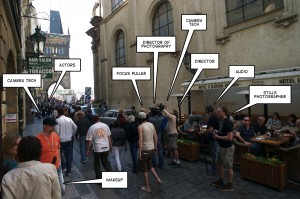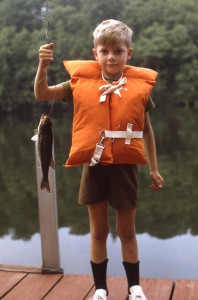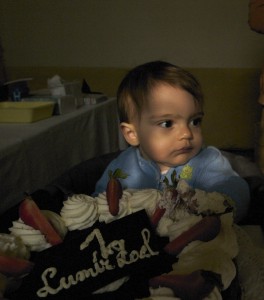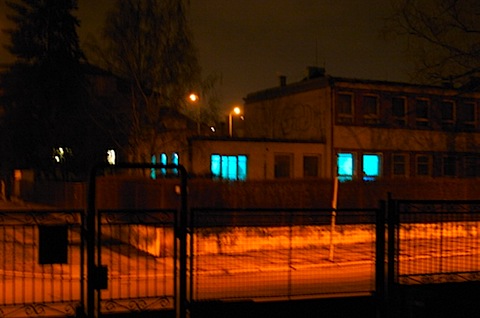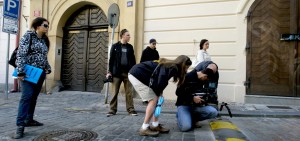
Setting up for an exterior shot
I ran into Cowboy Bob on the Metro, which I thought fortunate because I don’t know my way around the middle of Prague very well. It’s just not a place I’m tempted to go very often. There’s nothing there you can’t find in other neighborhoods for a lot less. Nothing, that is, except ancient architecture, narrow cobbled streets and all-around old-world atmosphere. For this part of the shoot, that’s what we were looking for.
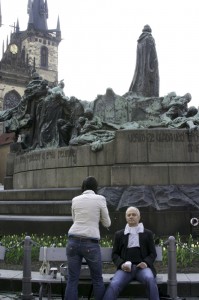
Applying makup in the square
A minimal crew (only about eight of us) gathered at the statue of Jan Hus, and after some caffeine and makeup we were on our way. The goal was to get as many guys-walking-down-little-streets shots as possible before U Sudu was available at 10:00. Our time would be very limited at the bar, so it was important not to waste any of it. It’s not uncommon to see kids running around making little movies around town, but I think we stood out, what with our big ol’ camera, another guy to do focus, and so forth.
It was a fun morning for those of us who didn’t have to carry the camera, and I got quite a few pictues in the good light. (There’s another guy in charge of taking good pictures.) All in all, a pleasant morning. Then it was off to our favorite subterranean bar. (They’re our favorite because they let us shoot there for free.) The gaffers were already unloading gear when we arrived, and Tomaš and fuego put their heads together to plan the first shot, handheld following the action, arranged to show off some of the cool ironwork. Then the shooting progressed lower and lower into the bowels of the bar.
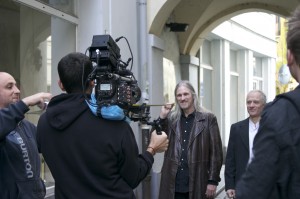
Measuring the distance from the lens to Cowboy Bob's nose
Down in the depths, the bar had not been cleaned from the night before. There was broken glass here and there, dishes in the sink, straws strewn, sticky spots on the floor. Lenka did most of the cleanup, with some support from me.
Low-tech visual effects: we didn’t have a smoke machine, but the grip and gaffers had cigars, and would puff up a storm before each shot.
At 1 p.m. fuego said, “We have four more hours. It’s not going to be enough.” I wasn’t surprised to hear it, having seen enough filmmaking in my limited career to know that there are wide shots and coverage shots (shots featuring a particular actor) with lenses of varying lengths, then there are shots to show the details (money hitting a counter, things like that), and so a fairly simple scene can several different camera setups. In general it’s the setup that takes time; lights have to be adjusted, focus figured out for each stage of the shot, and so forth.
Once again I was grateful to have so many experienced people on the crew. They had worked together before, knew what they were doing, and got us set up each time with a minimum of fuss. The time saved meant more setups, more shots, and better coverage. Not to mention that these guys were creating some visually dramatic stuff while they were at it.
Due to the fluid nature of our movement through the location and the limited space, I wasn’t able to watch a monitor as we shot, so I still haven’t gotten the full effect, but fuego assures me it’s good. For much of the day my role was alternately acting coach and furniture mover. I was also in charge of getting some munchies — and apple juice. There is whiskey in our story (Old Ray Black was a bourbon man), but whiskey is expensive and after a few takes the actors would be turning green, so we substituted apple juice. Steve (rhymes with Cowboy Bob) drank a lot of apple juice. By the end he was starting to feel a little queasy even with the benign juice.
Time keeps on Slippin’ into the Future, as Steve Miller pointed out, and the crew was working to get us all the shots we needed, but at the end, we were forced to compromise, and take it on faith that (for instance) the wide shot with Paul sitting down was a good as it looked to fuego, so no coverage shot of that was necessary. I wished later that I’d written down more notes about each shot, because in several of the wide takes there’s a bad chair noise when he sits. The last one was good, though, so I hope that’s the take fuego is relying on.
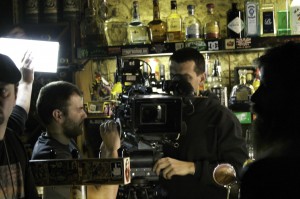
Setting up in the bowels of U Sudu
You have no idea how many things can go wrong in a take. There’s the obvious problem of the actor missing on the performance, but in fact what you are hoping is that the actor’s performance is good when all the other shit actually works. Were I in the position to hire actors, I would choose consistent actors over great ones.
Although, I just did hire actors, didn’t I? There’s one line delivered brilliantly in rehearsal that never popped as well in performance, but fuego was really pleased with the performance of the line on camera, on more than one take. He just didn’t have the rehearsal to compare it to. And maybe on camera there were subtleties I could not pick up.
There’s a moment of transformation, when Cowboy Bob leans back, knows his job is done, and gets up to leave. fuego proved his chops as a director right there, once the lenses and the lights and the angles were figured out he guided the actor through the timing of this gradual transformation. While rolling he said “now look across at Paul… smile a little… lean back…” Past all the technical details it was all about telling a good story. Budget, crew, schedule, time left to film in the location — all details. Story is the thing. That’s what the business is about, in the end, a story well told. fuego’s a storyteller.
Early in this game fuego said, “here’s how we take over the world,” and my little project became an effort to make something really spectacular. I hope we succeed. fuego’s put a lot of his personal credibility on this script, and on what we can make of it. I’ve improved as a performance coach this time, but I could have done better. The nitty gritty details, I want nothing to do with. I want to watch the monitor, watch the actors, help them be awesome. I want my story to come to life. In film that is an incredible team effort.
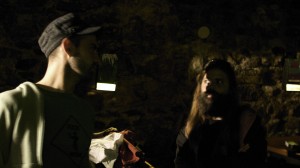
Miki and fuego
In the novel biz, we laugh at the people who are worried that someone will steal their idea. An idea is nothing; it’s all about execution. No one will steal your writing. Or at least if they do it’s easy to trace. The importance of execution applies in the movie biz as well but the execution is a massive collaboration in which the writing is important but there’s a lot more. The original script is little more than a template. Two crews with the same script will end up with different movies.
The day ended, and fuego canceled the evening exterior shots. I think the stress of getting what we needed down there, and the weight of being director, tired him out. We were loading our stuff out (a bit late), we were in a bar, and it was a chance for me to buy beers for everyone. A moment not to miss. (Though now that I think of it, fuego picked up a big part of the tab.)
So we enjoyed the evening when really we should have been shooting, relaxed, and hung out. I was all right with that, and as Executive Producer, it’s my call. Apparently.
 2
2
Sharing improves humanity:


